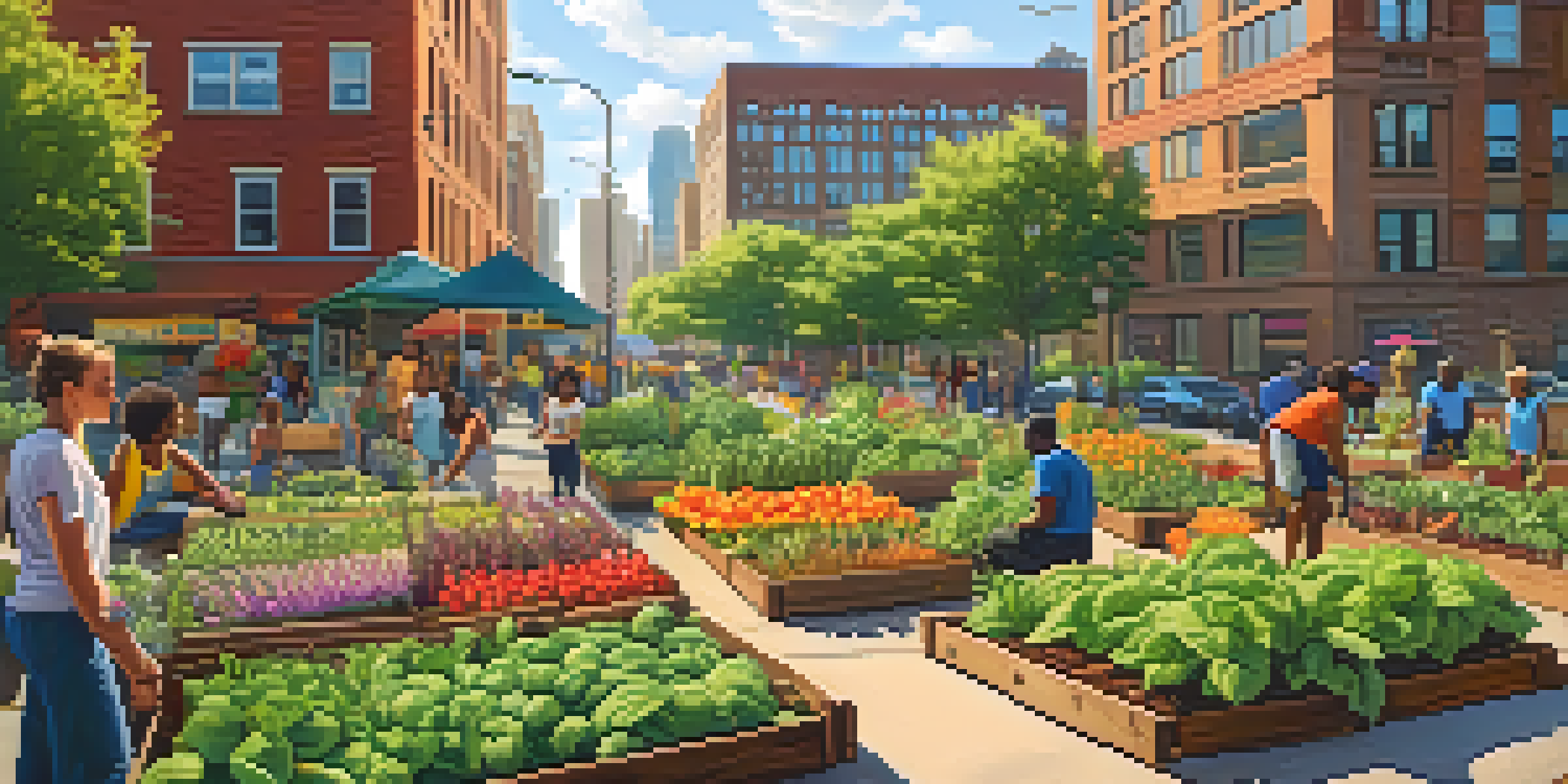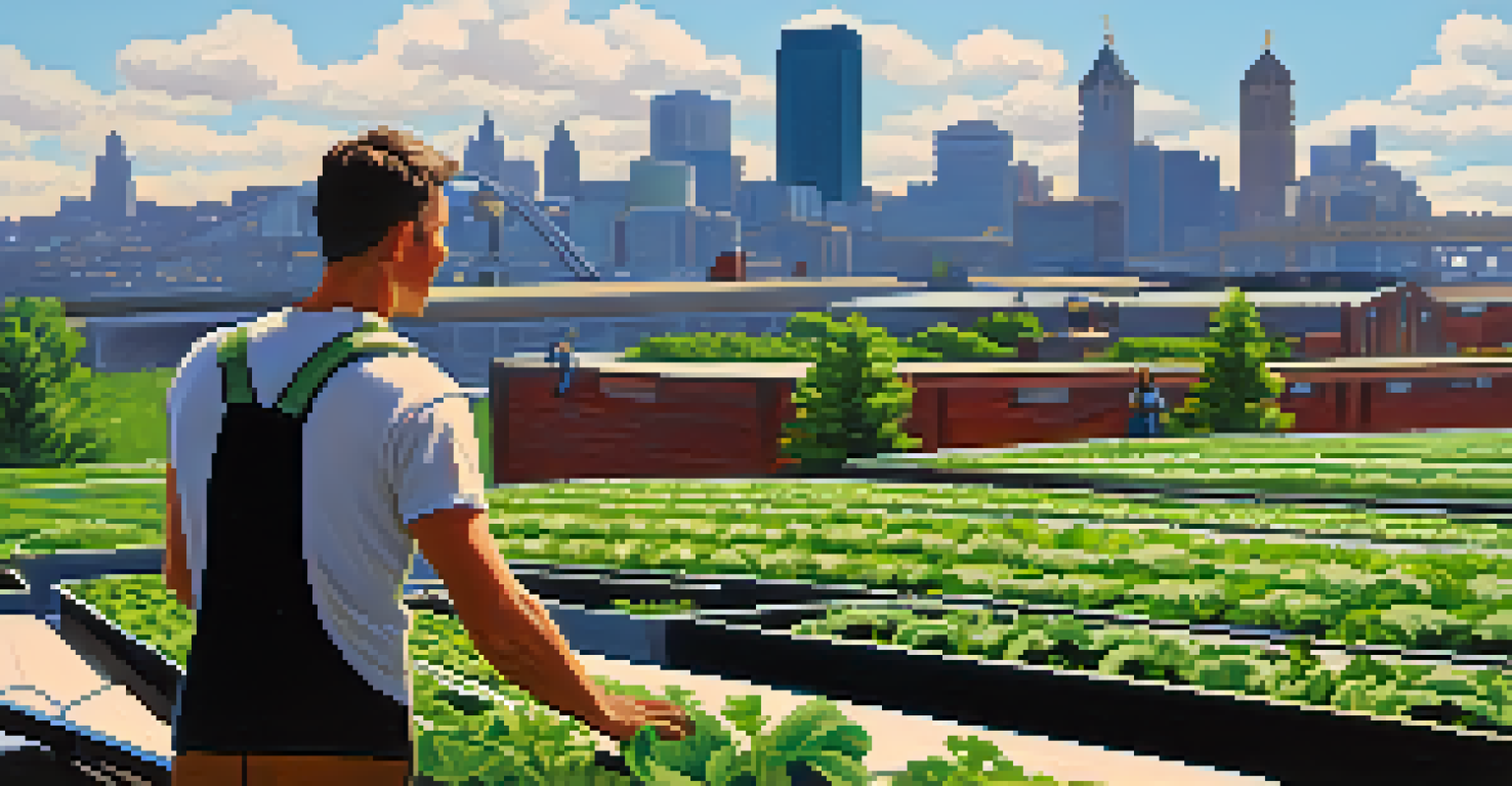Urban Farming: Pittsburgh's Role in Sustainable Food Systems

Understanding Urban Farming and Its Importance
Urban farming refers to the practice of cultivating, processing, and distributing food within an urban environment. This innovative approach not only addresses food security but also promotes sustainable practices by minimizing transportation costs and carbon footprints. Moreover, urban farming helps revive neglected spaces, turning them into vibrant green hubs that contribute to biodiversity and community well-being.
The future will be green, or not at all.
In cities like Pittsburgh, urban farming is gaining traction as residents and organizations recognize the benefits of locally sourced food. Imagine transforming a vacant lot into a flourishing garden where fresh produce is grown right in the heart of the city. This movement aligns perfectly with the goal of creating sustainable food systems that are resilient and responsive to community needs.
Additionally, urban farms often serve as educational platforms, teaching residents about nutrition, gardening, and environmental stewardship. By fostering a deeper connection between people and the food they eat, urban farming empowers individuals to make informed choices that benefit their health and the planet.
Pittsburgh's Urban Farming Landscape
Pittsburgh boasts a diverse array of urban farms, each contributing uniquely to the local food ecosystem. From rooftop gardens to community plots, these farms are not just productive spaces; they are also gathering points for community engagement and collaboration. Local initiatives, such as Grow Pittsburgh, play a vital role in supporting these farms and facilitating education on sustainable practices.

One noteworthy example is the Braddock Farms project, which utilizes reclaimed land to grow fresh produce for local residents. This initiative not only provides food but also fosters a sense of community and resilience among participants. It's a perfect illustration of how urban farming can revitalize neighborhoods and create a shared purpose.
Urban Farming Boosts Community Health
Urban farming enhances food access and promotes healthier lifestyles by connecting residents with fresh, locally sourced produce.
Moreover, the city's commitment to sustainability is evident in its policies that promote urban agriculture. By integrating urban farming into city planning, Pittsburgh is setting a precedent for other cities to follow, demonstrating that local food systems can thrive even in densely populated areas.
The Role of Community in Urban Farming
Community involvement is at the heart of successful urban farming initiatives. Local residents often come together to cultivate gardens, which fosters a sense of ownership and pride. This collective effort not only strengthens social ties but also enhances food access for all community members, particularly in underserved neighborhoods.
Urban agriculture is not just about growing food, it's about creating community and strengthening local economies.
Take, for example, the North Side community gardens that have transformed vacant lots into productive spaces. These gardens serve as a testament to how collaboration can create lasting change, providing fresh fruits and vegetables to families who may otherwise struggle to afford them. The shared labor and knowledge exchange also build a stronger community identity.
Additionally, urban farms often host workshops and events, inviting residents to participate in the process of growing food. This engagement sparks interest in sustainable practices and encourages people to take an active role in their food systems, ultimately leading to healthier lifestyles and more resilient communities.
Challenges Faced by Urban Farms in Pittsburgh
While urban farming in Pittsburgh is thriving, it does face several challenges that need to be addressed. Access to land is a significant hurdle, as many potential farming sites are owned by private entities or are unsuitable for cultivation. Securing consistent funding and resources is also a common struggle for many urban farms, which often rely on grants and donations to sustain their operations.
Moreover, urban farmers must navigate issues such as zoning regulations and soil contamination. Ensuring that the land is safe and suitable for growing food requires careful assessment and, in some cases, remediation efforts. This adds another layer of complexity to the already demanding work of urban farming.
Challenges in Urban Agriculture
Pittsburgh's urban farms face hurdles like land access, funding, and regulatory issues that require ongoing community support.
Despite these obstacles, many urban farmers persevere, driven by their passion for sustainable agriculture and community building. Their resilience highlights the need for continued support from local governments, organizations, and residents to create an environment where urban farming can flourish.
Innovative Practices in Urban Farming
Innovation is a key aspect of urban farming, and Pittsburgh is no exception. Many local farms are experimenting with advanced techniques such as hydroponics and aquaponics, which allow for efficient cultivation in limited spaces. These methods not only maximize yield but also significantly reduce the amount of water and space needed for growing food.
For instance, some urban farms have adopted vertical farming systems, utilizing multi-layered spaces to grow crops upwards rather than outwards. This approach is particularly beneficial in urban settings where ground space is at a premium, demonstrating how creativity can lead to sustainable solutions.
Furthermore, the integration of technology, such as smart irrigation systems and data analytics, is enhancing the efficiency and productivity of urban farms. By leveraging these innovations, Pittsburgh's urban farmers are setting a benchmark for sustainability and efficiency in urban agriculture.
The Impact of Urban Farming on Local Economies
Urban farming has a significant positive impact on local economies in Pittsburgh. By providing fresh, locally grown produce, urban farms help reduce the reliance on food imports, keeping money within the community. This not only supports local farmers but also creates jobs and stimulates economic growth in surrounding areas.
Moreover, many urban farms engage in direct-to-consumer sales through farmers' markets and community-supported agriculture (CSA) programs. These models foster a strong connection between consumers and producers, allowing people to support local businesses while enjoying fresh, seasonal food. It's a win-win situation that enhances the community's economic resilience.
Innovative Techniques Drive Growth
Pittsburgh's urban farmers are utilizing advanced methods like hydroponics and vertical farming to maximize yield in limited spaces.
As urban farming continues to grow, it has the potential to attract tourism and food enthusiasts, further bolstering the local economy. Events such as farm tours, workshops, and festivals can draw visitors to the area, showcasing Pittsburgh as a hub for sustainable food practices.
Future Prospects for Urban Farming in Pittsburgh
Looking ahead, the future of urban farming in Pittsburgh appears promising. With increasing awareness of food systems and sustainability, more residents are likely to engage in urban agriculture initiatives. This growing interest can lead to an expansion of existing urban farms and the establishment of new ones throughout the city.
Furthermore, as cities grapple with climate change and food security issues, urban farming is becoming an integral part of the solution. Pittsburgh's commitment to sustainability and community resilience positions it well to lead the way in developing innovative food systems that can adapt to future challenges.

Ultimately, the success of urban farming in Pittsburgh will depend on the continued collaboration between residents, local organizations, and government entities. By working together, they can create a vibrant urban agriculture scene that not only provides food but also enriches the community and enhances the city's overall quality of life.